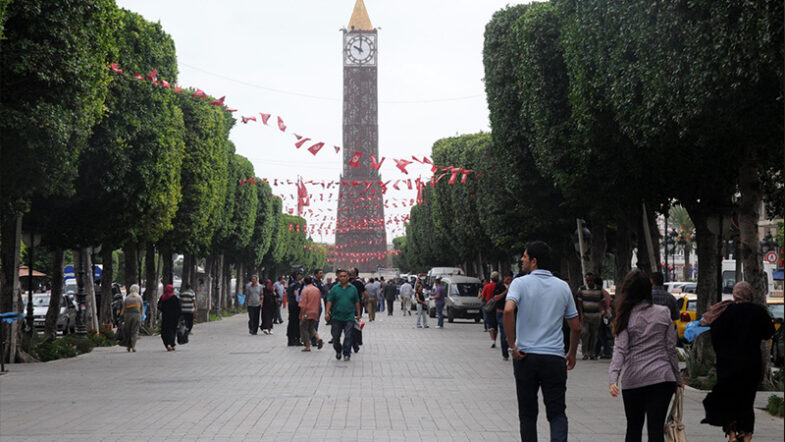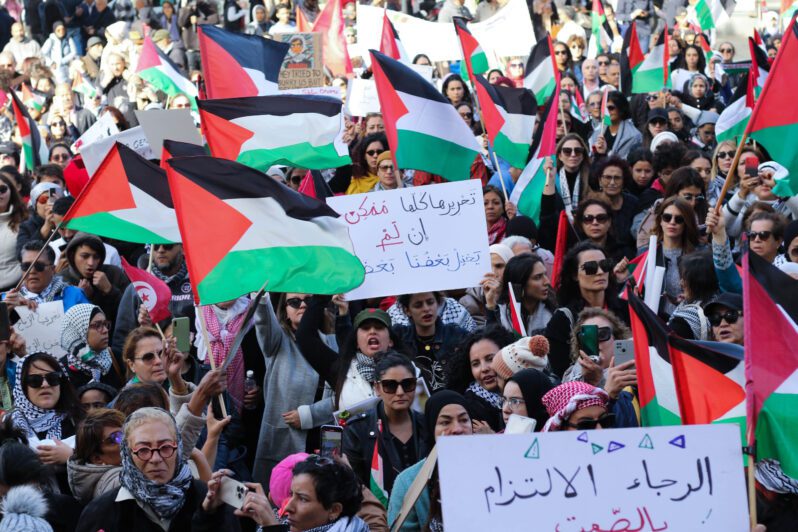The Economic Universe of Kais Saied: A Critical Analysis

Since July 25, “the current phase is distinctly economic” and “the president must form an economic salvation government” have become common phrases in Tunisia’s political discourse. The economistic view calls for politics to be kept out of economics. Political actors must make way for experts and specialists to sketch the country’s economic future. For World Bank Vice President for Middle East and North Africa Ferid Belhaj, the situation is clear: “A prime minister with an economic background must be chosen so that he is heard abroad”, he recently stated.[1]
Opposite this apolitical economism, which asserts its pragmatism through numbers and indicators, stands President Kais Saied as a key determiner in the current political process and a vessel for broad hopes of salvaging the national economy. How does the constitutional law professor view economics as a whole? What are his fundamental economic ideas concerning the country’s economic and financial predicaments? Does he have a vision for economic change, or will he refer economic affairs to experts and specialists, as demanded by international donor institutions?
This article will address these questions by referring to Saied’s economic discourse and analyzing the nature of the relationships he strives to build with major economic actors both inside and outside Tunisia.
Moralizing the Market and Appealing to Religious Conscientiousness
As soon as he announced the exceptional measures, Saied realized that he needed to insert economics into his political discourse in order to legitimize the new phase. The president, to whom all executive power had devolved, opted to address economics via a moral construct. He implored wholesale and retail merchants to reduce prices: “I am asking merchants to reduce prices. A true Muslim does not sleep while his neighbor goes hungry and without dinner”. Likewise, he lauded the story of a citizen who hung on his produce a sign reading “whoever is without [money] takes for free”.
Within this conception, the phenomena of speculation, fraud, and monopolies appear as moral deficiencies and a gross failure to stand for religious values, and a moral commitment to lower prices is deemed a key means of treating the market and combating its negative phenomena. It is no coincidence that the non-compulsory nature of moral obligations, which hinge on individuals’ consciences, accorded with the advertising policy of the superstores – which announced discounts on some consumer goods without clarifying the amounts, the goods included, or the time limit – especially as they usually introduce similar seasonal discounts. This announcement was enough to satisfy the president, who received a delegation from the Tunisian Confederation of Industry, Trade, and Handicrafts and deemed the discounts a contribution to the new economic battle. During the meeting, Saied remarked, “National capital will rise to the historical occasion”.
This tentative mutual satisfaction between the president and “devout” business owners is based on the idea of moral commitment or “national sentiment”, in the president’s words. The idea is an alternative to the principle of effecting legal and institutional control over prices and the market in general. The president appears to have an idealistic conception of the market, its laws, and the phenomena therein that led to rising prices. In reality, this structure pervaded by monopolies, unregulated trade, hoarding, violation of the law of supply and demand, and complicity by the official monitoring bodies cannot be addressed via declarations of intent and fragile moralistic compacts.
In this context, the section of the annual report of the Court of Accounts addressing the program for upgrading distribution channels for agricultural products provides insight into the structural crisis afflicting the agricultural products market. The report mentions that agricultural products are not always subject to the principle of supply and demand, and that the prices of many have therefore increased even though they are abundant in wholesale markets. Profit margins at retail sale reached a peak of 84% in 2016, and the percentage of fruits and vegetables sold outside wholesale market channels had reached 55% by 2018. The report also mentioned that the absence of a market management information system prevented the National Supply and Prices Observatory from monitoring distribution channels: “Its role was limited to tracking quantities marketed and prices for 24 of 82 wholesale markets – i.e. coverage in the range of 30%, which is insufficient to identify indicators concerning competition or monopolistic practices”.[2]
Historic Solidarity and the “Surplus of the Coffers”
Shortly after his election as president, Saied lauded an initiative by anonymous citizens calling on people to donate one workday per month to the public treasury. He commented, “Some people in and outside Tunisia declared that they would donate one workday a month until the state coffers are in surplus and we escape debt”. Following the announcement of exceptional measures on July 25, the president once again invoked the story of money hidden in Tunisia, stating that “Tunisia isn’t poor – we hear of billions” and “some people have enough money for [all] Tunisians”.
Based on this conception of citizen and business solidarity with the state as an enormous financial resource, the president lavishly praised the initiative by the Tunisian Professional Association of Banks and Financial Institutions (APTBEF) to donate TND160 million [USD53 million approx.] to the public treasury. The president met APTBEF representatives and told them, “What you did is a testament to your honesty and engagement in the battle for national liberation”. He added, “You pay taxes on profits so that no person remains poor in Tunisia. Thank you for this historic stance and for standing together on the same front”. This grand celebration indicates that the bank lobby succeeded to some extent in adapting the solidarism that the president reveres to serve its own interests, even though this sector is facing unprecedented accusations of financial and economic corruption – corruption partially documented in the latest annual report by the Court of Accounts. The banking transgressions revealed in the report concern governance and internal oversight, combating money laundering, affording loans with excessive interest rates, and excessive rates of return on deposits.[3]
The president also seems to be aware of the large fiscal imbalances afflicting public finance in 2021, but he views the plan to mobilize state resources with moral normativism embodied by the idea of “historic solidarity”. The effects of this idea on the economy and society cannot be measured because it is not so much a tangible program as a description of transitory emotional responses not sufficient to rescue a public budget on the brink of collapse and facing an unprecedented debt crisis. So far, the public finance crisis seems to be teetering between a search for external resources via foreign loans and recourse to domestic borrowing via local banks. The foreign option remains uncertain given the unstable transition through which the country is passing. As for the domestic option, the banks have refused to lend to the state over the long term.
In this context, economics professor Abdeljelil Bedoui mentions the limits of the traditional means of funding a state budget deficit in his study on the public finance crisis in 2020 and 2021.[4] These means include “reducing the deficit by offloading it onto public institutions”, “resorting to indirect funding via banking institutions, which entails a high cost that exacerbates the public budget crisis”, “increasing direct and indirect taxes without regard for the need to resist the growth of fiscal injustice and improve fiscal fairness and without positive effects in terms of savings, investment, and growth”, and “continuing to resort to foreign borrowing, which has become difficult, extremely costly, and in any case undesirable because it subjects the country to extortion and harsh conditions that undermine national sovereignty, reduce development prospects, and lead to austerity policies”.
Bedoui also says that exceptional measures are necessary to increase the state’s self-generated resources. These measures include combating tax evasion (which would provide enormous additional resources to the public treasury), blocking currency-smuggling pathways, “replacing the current currency with a new currency that makes it possible to uncover illegally acquired monetary wealth”, “suspending the import of a list of luxury goods and raising the customs fees on semi-luxury goods”, “re-negotiating trade agreements”, and “reviving the concept of a bilan en devises [currency balance sheet] for commercial activities”.
“Brethren and Friends Will Stand with Tunisia”
Foreign countries featured prominently in the discourse of President Saied, who sought to reassure global donor institutions and lender states that his seizure of power is not a threat to foreign interests or renunciation of previous financial commitments or economic agreements. This reassurance came in the form of constant references to the idea of the continuity of the state. In a meeting with the World Bank’s vice president for Middle East and North Africa, Saied said, “The exceptional measures were taken to preserve the Tunisian state. Coalitions change and governments change, but the state must persist”. Amidst much foreign attention to the Tunisian situation following July 25, there was an increase in domestic debate over the nature of foreign stances on Saied and their role in determining the course of the coming phase. Hence, on multiple occasions, Saied sought to highlight the presence of a regional and global belt of support for the exceptional measures. He stated, “After they [i.e. unspecified parties] emptied the state coffers, our brethren and friends have rallied together to support the Tunisian people”. He added, “Communications are underway with our brethren to plug the fiscal imbalances, for they have been wonderful friends and brethren”.
So far, President Saied seems like he will not deviate from the traditional approach to managing foreign relations. It appears that he will continue to construct shaky economic partnerships driven by continuous borrowing policies and the implementation of structural adjustment programs, as well as dependence on regional and international aid and donations as part of a propagandistic policy that gives the illusion of diplomatic success in rallying financial support for the country. This course will most likely lead to the formation of a “technocratic government” that resumes negotiations with the International Monetary Fund over new loans contingent on a commitment to revise the public support system, adopt austerity policies, and encourage private investment.
This article is an edited translation from Arabic.
Keywords: Tunisia, Public finance, Economics, Corruption, Exceptional measures
[1] “Balhaj: al-Bank al-Duwaliyy Yahtaju Hukuma wa-Ra’is Wuzara’ li-l-Tahawur wa-Da’m Tunis”, Mosaique FM, 1 September 2021.
[2] Court of Accounts, 32nd Annual Report, 12 February 2021, “Barnamij Ta’hil Masalik Tawzi’ al-Mantujat al-Filahiyya”.
[3] Court of Accounts, 32nd Annual Report, 12 February 2021, “al-Ishraf ‘ala al-Qita’ al-Bankiyy”.
[4] Abdeljelil Bedoui, Azma al-Maliyya al-‘Umumiyya Sanat 2020 wa-2021: Ayy Qira’a li-l-Mawjud wa-Ayy Hulul li-Tahqiq al-Manshud, Tunisian Forum for Social and Economic Rights.



